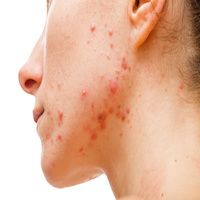Article
Acne Vulgaris Treatment Effectiveness More than Doubles with Adherence to Pharmacologic Therapy
Author(s):
A study in BMC Dermatology suggested that adherence to pharmacological treatment and adjuvant therapies are both key factors for improvement in cases of mild to moderate acne vulgaris.

A study in BMC Dermatology suggested that adherence to pharmacological treatment and adjuvant therapies are both key factors for improvement in cases of mild to moderate acne vulgaris.
According to the study results, good adherence to adjuvant treatment was associated with a 2.2-fold increase in the probability of adherence to topical pharmacological treatment and with significant reductions in the severity and number of acne lesions.
The findings highlight that because proper treatment of acne can take a long time for chronic acne sufferers, clinical studies regarding acne outcomes show generally poor adherence to treatments. The problem can be somewhat exacerbated in those who suffer from mild to moderate acne, because those patients are often less motivated to stick closely to their prescribed regimen, and are more easily discouraged by side effects and irritants of systemic therapy.
Adherence is particularly low for regimens that call for a combination of both topical and systemic therapies. “The treatment plan and the choice of specific active ingredients should take into account not only the individual characteristics of the patient and/or the disease but also their preferences and expectations with treatment as well as questions of convenience,” the study authors noted.
The current trial, dubbed ACTUO, enrolled 643 subjects, and 566 completed the three study visits over three months. It was considered that patients who followed all their doctor’s instructions and recommendations in at least three of the four assessments showed compliance with the medical advice. The effects of adherence to adjuvant treatment on the doctor’s and patient’s final assessments of acne severity was compared in patients “without /practically without lesions” (FDA scores = 0—1) and patients “with lesions (FDA scores ≥ 2–4).
Overall, clinical improvement was observed throughout follow-up visits with an increased proportion of patients who reported reductions of ≥50 % on the total number of lesions (two months: 25.2 %; three months: 57.6 %) and reductions of severity scores (2.5, 2.0 and 1.3 at 1, 2 and 3 months after treatment, respectively). Adherence to treatment was associated with a significant reduction on severity grading, a lower number of lesions and a higher proportion of patients with ≥50 % improvement.
“Our findings reveal that dermatologists in Spain frequently prescribe specific adjuvant treatment for acne,” the study authors noted. “They recommend the use of specific products including non-comedogenic soaps and moisturizers in over 80 % of acne patients. The synergy between the effects of drug treatment and adjuvant products can improve comfort during the various stages of treatment and can encourage patients to continue the application of the products. Adherence to adjuvant treatment was associated not only with a 2.4-fold increase in the probability of adherence to pharmacological treatment, but also with a significant reduction in acne severity, in the number of lesions as assessed by both the treating physician and the patient, and a higher percentage of patients whose severity improved by 50 % or more.”





